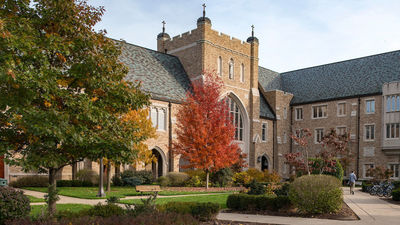Winners of Smith-Doheny Legal Ethics Writing Competition announced

Professor Veronica Root Martinez, director of Notre Dame Law School’s Program on Ethics, Compliance & Inclusion, announced the winners of the 2020 Smith-Doheny Legal Ethics Writing Competition, with 3L Allison Lantero taking home the top Notre Dame prize and Michigan State University School of Law 3L David Konarske Jr. taking home the top prize overall.
“We received two dozen amazing pieces of scholarship from students from all across the U.S. and Canada. I’m heartened to know that this next generation of lawyers is actively engaged in thinking critically about the ethical issues confronting the legal profession today.”
The Smith-Doheny Legal Ethics Writing Competition is an annual contest, first started in 1997, that looks for the best papers on legal ethics among U.S. and Canadian law students. Selections are made through a “blind” review process.
Lantero’s paper, “The Curtis Flowers Saga: A Failure of Prosecutorial Accountability,” focuses on the six trials of Curtis Flowers, a man who was on death row in Mississippi for the 1996 shooting deaths of four people before being freed on bail in advance of a seventh trial. Lantero uses the lens of the Flowers case to illustrate the ineffective checks on prosecutorial power in America.
“Allison’s paper struck me from the outset, as she explained that when prosecutors ‘are caught behaving badly — withholding evidence, asking improper questions, making prejudicial statements during closing argument, or even using strikes to remove all the persons of color from a jury — most face no consequences at all. In fact, they often get a chance to try again.’ She beautifully and effectively demonstrated this reality through her recounting of the Curtis Flowers case.”
Konarske’s paper, “Transparency as Justice: The Ethics of Public Attorneys and Judicial Seals,” focuses on legal and ethical standards for public sector attorneys, specifically mandating that these attorneys object to the use of judicial seals to ensure that courts use proper balancing tests.
“David’s paper is fascinating. He discusses ‘[t]he use of judicial seals to conceal information highly relevant to public health and safety.’ I have always been under the impression that judges seal information from the public domain in only rare occasions, but his paper demonstrates that the use of judicial seals can be highly problematic and dangerous for the public.”
Lantero said she was honored to be chosen, and intends to donate her prize money to the NAACP Legal Defense and Educational Fund and the Equal Justice Initiative.
“I am thrilled to have my paper recognized in this way,” Lantero said. “I hope it will spark a real conversation around the enormous power we as a society grant to prosecutors and the reforms we can implement towards creating a justice system rooted in justice.”